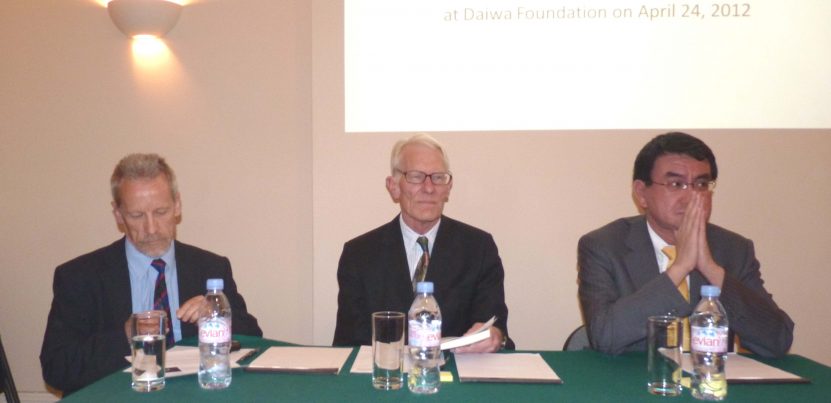 Seminar Series 2012
Seminar Series 2012Tuesday 24 April 2012
6:00pm – 7:45pm
Political Leadership in the UK and Japan
Drinks reception from 8:45pm
Daiwa Foundation Japan House
Organised by the Daiwa Anglo-Japanese Foundation
The third seminar in our 2012 series Leadership: People and Power in the UK and Japan looked at political leadership. The governing party changed in Japan in 2009 and the UK in 2010. In both cases, the new ruling party had spent a prolonged period out of power, and its leaders have had to forge a coalition to achieve a majority. Japan has plenty of experience of coalition governments, but its political leaders have often been criticised for ineffective leadership, and faced particular challenges following the earthquake last spring. What can the two countries learn from each other about political leadership? And to what extent are different leadership styles required by the different institutional set-ups in each country?
Arthur Stockwin, the chair, introduced Taro Kono, the first speaker, by highlighting that he is a leading, independent-minded and well-known Liberal Democratic Party (LDP) politician who has been in parliament since 1996 representing a constituency in Kanagawa Prefecture. In the 2005 elections he won the second highest number of votes in any election in Japanese electoral history.
Taro Kono began by saying that political leadership has been lacking in Japan and that is why prime ministers do not remain long in office. During his 16 years in parliament there have been ten prime ministers and over 13 foreign ministers.
Kono went on to list five reasons for the lack of political leadership in Japan: short-lived governments, incompetence, the pressures of parliament, an unclear decision-making system and a lack of ideology in the two major parties.
Though the prime minister can remain in power for a maximum of four years, general elections tend to be held every couple of years in Japan, explained Kono. In the years when the LDP dominated the Lower House, elections were all about their majority in the Diet.
Kono then reflected on incompetent ministers who cling on to power. The first time a Lower House member is elected, they are told that their only priority should be to win a second term. If they achieve this, in their second term they are promoted to Parliamentary Secretary, in their third term they become Chairman of a Party Policy Committee, in their fourth term they become Senior Vice Ministers or a Chairman of one of the Standing Committees and in their fifth term they are eligible to become government Ministers, in this way automatically climbing the ladder.
Giving an example of the parliamentary pressures on Ministers, Kono said that the Japanese Foreign Minister is required to attend nine different committees in the Lower House (the Defence Committee, the Special Committee on Abductions and the Special Committee on Okinawa to name a few) and three special committees in the Upper House. As a result of the pressure of parliamentary business, they are only able to travel overseas at weekends. Kono has requested that the burden of committee attendance be reduced, but this was refused by his Democratic Party of Japan (DPJ) counterpart.
Commenting on unclear decision-making, Kono explained that the Lower House can elect the prime minister, pass the budget and ratify treaties. While the Upper House is subordinate to the Lower House, its consent is needed to pass all other laws including those giving the government authority to borrow , tax bills and Bank of Japan appointments.
At present the LDP is obstructing the coalition by refusing to grant it borrowing authority. Without this, the government would run out of money in September. The number of LDP members in the Upper House is actually smaller than the number of DPJ members, so if the LDP were to be voted back into power their policies would also be gridlocked in the Upper House in the same way.
Ideally the opposition should let the party or parties in power rule and avoid wilful obstruction in return for the same favour. The truth is, said Kono, that the parties don’t trust each other.
In the UK the idea of collective responsibility only applies to the Cabinet whereas in Japan this concept applies to all members of the governing party. As is also happening in China, the party, in Japan, is stronger than the government.
Going on to talk about the ideology of the major Japanese parties, Kono said that the LDP is considered to be conservative but that no one knows what “conservative” means. Does it encompass a prime minister’s visits to Yasukuni Shrine or the singing of the Japanese national anthem? The LDP and the DPJ have no ideologies said Kono; they simply represent, respectively, the party for big government and the party for even bigger government.
The parties need to be redefined, said Kono, in order to ensure a working party system. The LDP should be the party of economic growth, achieving this through small government, decentralisation, deregulation, an open economy, immigration (in the next 50 years the Japanese population will drop to 41 million people as it starts losing the population equivalent of a city the size of Marseilles every year) and promoting competitive and productive agriculture.
The new DPJ, on the other hand, should be the party of redistribution.
There are those in the LDP who want more redistribution and those in the DPJ who hanker after economic growth. They could swap parties, advocated Kono, and join the one that most clearly chimes with their views.
Responding to questions after his talk, Kono said that the present Japanese system will only improve with a redefinition of the parties and with the government being able to make decisions without full party agreement and allowing a degree of dissent within the ranks. Kono has been studying how the British Parliament works in order to further refine his vision. Kono said that the Japanese government needs to reduce expenditure and raise taxes, as David Cameron is doing, but that it lacks the people’s trust and support.
With regard to whether it is possible to have strong leadership in a bureaucratic country like Japan, Kono replied that the problem has less to do with bureaucracy and more to do with the fact that the Prime Minister is not given enough power.
The second speaker, Professor Keith Grint, spoke about leadership in general, saying that there are three categories of decision style: command, management and leadership and three types of problems: critical, tame and wicked.
Critical problems; i.e., crises, require command leadership. Crises, which tend to be domestic, financial or related to terrorism, are accompanied by general uncertainty. While people don’t know what to do, the commander has the answers. At such a juncture there is no time for discussion or dissent and coercion is legitimised as necessary to ensure the collective public good as opposed to private gain. Sometimes, nonetheless, a commander can be decisively wrong.
Tame problems are the equivalent of puzzles and are always unilinear and solveable. Relocating, for example, is often stressful but is something that can be done, i.e., it is a tame problem. Launching another new product is also a tame problem as it can be achieved by following standard procedures. Tame problems are to do with efficiency and ticking a check list. A heart by-pass is a tame problem – it can be solved through following scientific process and procedure.
Wicked problems, on the other hand, have no simple solutions. They are either novel or recalcitrant, complex rather than complicated and may be intransigent in which case one has to learn to live with them. Often it is difficult to solve a wicked problem in isolation as it may impact negatively elsewhere. Uncertainty is inevitable in wicked problems, which sometimes comprise contradictory certitudes. A contemporary wicked problem is climate change.
Political leadership confronting wicked problems must realise that these are not problems that can be solved through management or scientific processes. They require political collaboration and the leader’s role is to ask the appropriate questions and to engage collaboration. Wicked problems tend to be beyond one’s experience.
Alcohol problems have often been treated as tame issues. As long as individuals come through hospitals and are dealt with efficiently there, the problem appears to be under control. However, dealing with drunks in this way is really just to skirt the issue and focus on the wrong problem.
Grint also mentioned the Baby P (a 17 month-old boy who died from more than 50 injuries inflicted over an eight-month period during which he was repeatedly seen by Haringey Children’s services and NHS health professionals) case which resulted in heads rolling, specifically Sharon Shoesmith’s, who, as Head of Haringey’s Children’s Services, was the scapegoat. The fact is, said Grint, that it is just not possible to stop people killing children. All the extra processes built in to procedures as a result of tragedies and incidents like this simply put people at greater risk.
If people are provided with too many safety nets, according to Grint, they don’t take responsibility. On the other hand, too few safety nets would be disastrous.
It is important for leaders to be wheelwrights and to see leadership as an art. It is vital for a leader to surround himself or herself with experts, as in this way the leader will command a collective view. Grint gave the example of the captain of a ship who had had no seafaring experience. He took his direction from listening to the sailors who had all the relevant experience and knowledge, just as it is the strength and spacing of the spokes that makes a wheel strong. Asking questions and taking stock is key.
Grint agreed that political problems often seem to be wicked problems and that politicians often lack the ability to switch register and ask questions of the people or their advisors.
The chair, Arthur Stockwin, and Jason James, Director General of the Daiwa Anglo-Japanese Foundation, concluded by thanking the speakers for their detailed and clear presentations.
Professor Keith Grint PresentationThis event is supported by Japan Airlines.
About the contributors

Taro Kono
Taro Kono is a Japanese Liberal Democratic Party (LDP) politician and a 5th term Member of the House of Representatives in the Diet. Born in 1963, Kono graduated from Georgetown University with a Bachelor of Science in Foreign Service. While in Washington, DC, Kono served for then Democratic Congressman Richard Shelby of Alabama for two years. Kono joined Fuji Xerox in 1986, moved to Fuji Xerox Asia Pacific in Singapore in 1991, and subsequently served as Managing Director at Nippon Tanshi from 1993 to 1996. Kono served in Prime Minister Koizumi’s final government as Senior Vice Minister of Justice from 2005 to 2006. Until the LDP defeat in the General Election in August 2009, Kono was the Chairman of the Foreign Affairs Committee of the House of the Representatives. In September 2009 he ran for the Leadership of the LDP and lost to Sadakazu Tanigaki.

Professor Keith Grint
Professor Keith Grint is Professor of Public Leadership and Management at Warwick University. He is also a Visiting Research Professor at Lancaster University, an Associate Fellow of the Saïd Business School, a Fellow of the Windsor Leadership Trust, a Fellow of the Sunningdale Institute, and a Visiting Scholar at Sydney University. He is a founding co-editor of the Sage journal Leadership, and also co-edits the Sage Handbook of Leadership. He has written on various aspects of leadership, including: leadership theory (Leadership: Limits and Possibilities, 2005); historical aspects of leadership (The Arts of Leadership, 2001); leadership in the military (Leadership, Management and Command: Rethinking D-Day, 2008); and leadership in the public sector (The Public Leadership Challenge) (forthcoming) (ed. with Stephen Brookes). He wrote the literature review for ‘Strengthening Leadership in the Public Sector’ (2000) a project of the Performance and Innovation Unit (Cabinet Office).

Professor J A A Stockwin (Chair)
Professor J A A Stockwin is Emeritus Fellow of St. Antony’s College and the Nissan Institute of Japanese Studies, University of Oxford. His publications include: Dictionary of the Modern Politics of Japan (Routledge, 2003) and Collected Writings of J.A.A. Stockwin (Routledge, 2004). Professor Stockwin is General Editor of the Nissan Institute/Routledge Japanese Studies series. In 2004, he received The Order of the Rising Sun from the Japanese Government in recognition of his tireless efforts to promote Japanese Studies in the UK.
